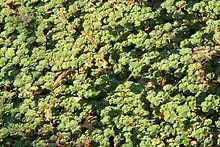Rubus rolfei
Rubus rolfei, known as creeping raspberry, crinkle-leaf creeper,[2] or Taiwanese creeping bramble,[3] is a low-growing member of the genus Rubus and is related to the blackberry and raspberry. It is common in the horticultural trade.[4] The species is originally from Taiwan where it grows at high elevations.[3]
| Rubus rolfei | |
|---|---|
 | |
| Scientific classification | |
| Kingdom: | Plantae |
| Clade: | Tracheophytes |
| Clade: | Angiosperms |
| Clade: | Eudicots |
| Clade: | Rosids |
| Order: | Rosales |
| Family: | Rosaceae |
| Genus: | Rubus |
| Species: | R. rolfei |
| Binomial name | |
| Rubus rolfei | |
| Synonyms[1] | |
| |
Description
Like other plants in this genus, creeping raspberries bear aggregate fruits. Each "fruit" is actually a cluster of small fruit-like parts (pistils) connected together into one mass.
Creeping raspberry fruits are similar in appearance to blackberries or red raspberries, but differ in that their color is yellow to orangish-red. The edible fruits follow white flowers which are borne in early summer.[5]
Uses
Plants are sometimes used to form a low growing, non-invasive, semi-evergreen to evergreen ground cover.[5][3] Cultivars such as 'Emerald Carpet' are common in the plant trade.[3]
Taxonomy
The names Rubus pentalobus, R. hayata-koidzumii and R. calycinoides are considered taxonomic synonyms of Rubus rolfei.[1] Rubus calycinoides, as described by Otto Kuntze, is a distinct species.
References
- "Rubus rolfei Vidal". www.gbif.org. Retrieved 21 September 2022.
- Oregon State University Department of Horticulture: Rubus calycinoides
- Perennial Ground Covers by David S. MacKenzie: Rubus calycinoides
- "Rubus calycinoides | Landscape Plants | Oregon State University". landscapeplants.oregonstate.edu. Retrieved 22 September 2022.
- Washington State University: Rubus calycinoides